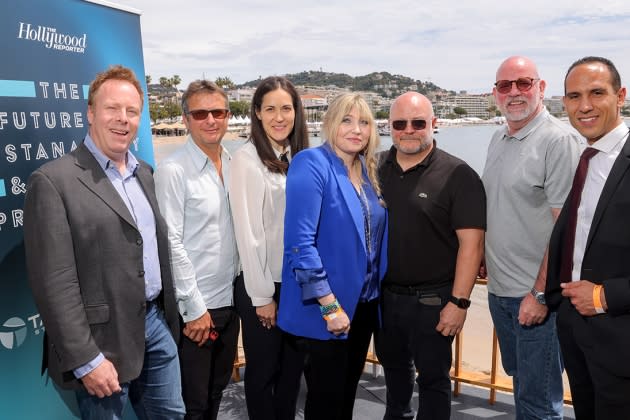Cannes Sustainability Panel: If A-Listers Take Private Jets, “It Doesn’t Matter How Eco-Friendly a Facility Is”

Cannes is not only about movies and film deals this time of year. It is also about film discussions.
During a Thursday panel on sustainable production, for example, topics ranged from reusable water bottles and the limiting of private air travel to the need for government support and net-zero production studios.
More from The Hollywood Reporter
Cannes: Elena Martín Gimeno's 'Creatura' Wins Best European Film at Directors' Fortnight
Idris Elba Takes on Terrorists in First Trailer for Apple Series 'Hijack'
'All to Play For' Review: Virginie Efira Excels in a Custody Drama With No Easy Solutions
Sitting on the panel were Phil Hunt, CEO of Head Gear Films and Bankside Films, Gareth Ellis-Unwin, the CEO of Bedlam Film Productions, Meg Thomson, executive vp of worldwide content at Globalgate Entertainment, producer Gareth Wiley, and Tage Studio’s Claire Havet. Deloitte’s Hassen Ouartani and Maria Quiros Grande also participated.
The panel, hosted by The Hollywood Reporter and sponsored by Tage Studios, was moderated by THR‘s Scott Roxborough and covered sustainable production, low-emissions filmmaking, LED lights, and more.
Havet noted that Tage, the first net-zero studio in the world, which is set to open in Portugal, had an important role to play. “We have a role in the industry toward everybody, because everybody is watching movies, and we need to start from scratch and imagine the most eco-friendly and sustainable complex where a producer can come,” she said.
Havet also argued that what was paramount was education on sustainable production and an emphasis placed on incremental changes, as opposed to a total about-face, which would receive pushback from the industry. She explained: “People don’t like to be forced [to do things] and they don’t like changes.”
Other panelists also discussed the importance of making a difference. “The world is moving towards a more sustainable place,” said Thomson, noting that certified sustainable productions can expect recyclable food trays and reusable water bottles on set all the way to different ways of how A-list actors travel to set. “The minute you have a private jet coming in, you upset your carbon balance so much.” Wiley said. “If an A-lister wants to come in on a private jet, it doesn’t matter how eco-friendly a [production] facility is.”
Panelists noted that sustainable production can be cost-prohibitive, especially for low-budget independent filmmaking. Hunt called on governments to assist in the efforts by offering tax credits that incentivize sustainable production. Even predominantly virtual production, which commonly has less resource cost because the production of sets and talent travel is limited, leads to massive energy expenditure because of the current technology of LED screens.
Film production is inherently migratory and has high resource expenditures, from lighting to craft services. Ellis-Unwin recounted an experience on a recent production in Jordan where he ran into an issue with using sustainable water bottles, saying, “There was no way to keep people hydrated in the desert, hygienically, without containers and containers and containers of water.”
The panelists also highlighted that when looking for sustainable solutions to production, with a dearth of government support and a universal set of best practices, it is important to tackle problems as they are presented. Said Wiley: “If you want to shoot on the side of a mountain, that comes with a carbon cost. What are you going to do about that carbon cost?”
Best of The Hollywood Reporter

 Yahoo News
Yahoo News 